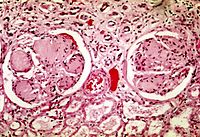
Photo from wikipedia
Background/Aims: Diabetic nephropathy is a common complication of diabetes. This study explored the renal protective effect and possible mechanism of gliquidone in mice with diabetic nephropathy. Methods: Animal model of… Click to show full abstract
Background/Aims: Diabetic nephropathy is a common complication of diabetes. This study explored the renal protective effect and possible mechanism of gliquidone in mice with diabetic nephropathy. Methods: Animal model of diabetic nephropathy was established in KKAy mice. The renal protective effect of gliquidone was studied by evaluating the kidney function through measures of urinary protein, blood urea nitrogen (BUN), serum creatinine (Scr) and serum triglyceride (TG) that were performed using an automatic biochemical analyzer. The levels of oxidative stress indicators, such as nitric oxide (NO), superoxide dismutase (SOD) and malondialdehyde (MDA), were evaluated in renal tissue homogenates using the automatic biochemical analyzer. The inhibitory effect of gliquidone on renal interstitial fibrosis and its association with Notch / Snail1 signaling pathway in diabetic nephropathy was investigated using molecular biological techniques. Results: It was found that low-, medium- and high-dose gliquidone improved the mice’s general health condition, such as mental status, fur condition, eating, and drinking. Gliquidone reduced the body weight and the kidney weight /body weight ratio of mice. Gliquidone improved the kidney function, indicated by reductions in urinary protein, blood urea nitrogen, and serum creatinine and triglyceride. Gliquidone treatment increased levels of nitric oxide and superoxide dismutase, but decreased level of malondialdehyde. The expression of Jagged1/Notch1/hes1/Snail1/α-SMA decreased, while the expression of E-cadherin increased in gliquidone-treated kidneys. High dose gliquidone showed the best effect, one that was similar to that of the positive control drug irbesartan. Conclusion: Taken together, our results suggested that gliquidone can ameliorate the diabetic symptoms of diabetic nephropathy through inhibiting Notch / Snail1 signaling pathway, improving anti -oxidative response and delaying renal interstitial fibrosis. The efficacy of gliquidone is dose-dependent.
Journal Title: Cellular Physiology and Biochemistry
Year Published: 2018
Link to full text (if available)
Share on Social Media: Sign Up to like & get
recommendations!